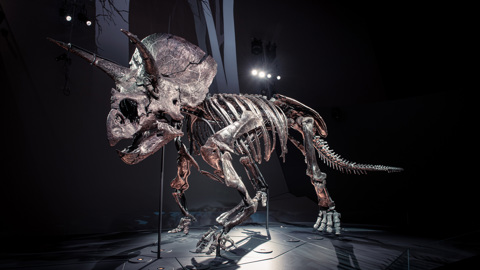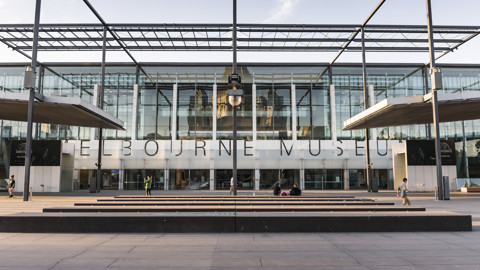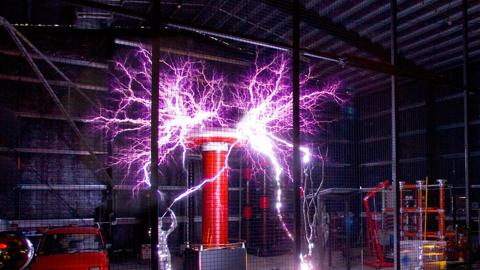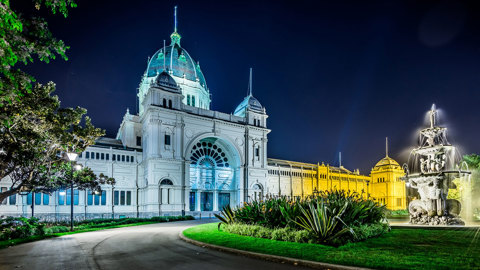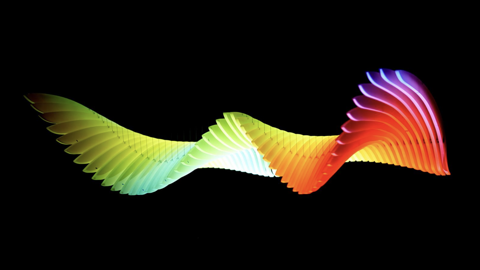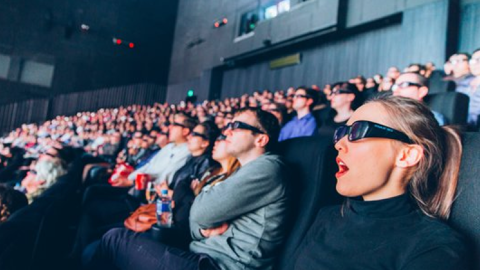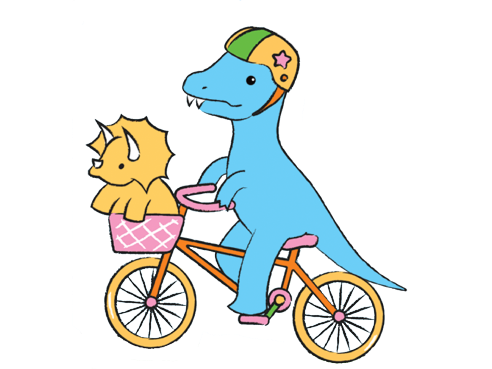People Like Them
Difference is not an easy thing to accommodate. It's not simple to embrace and respect and defend cultures that are different to your own. That's the nature if you like of human relationships. We gotta work and build on it. And it’s by having these sorts of debates, getting people to think about it and talk about it that we're going to move along.Mick Dodson, Co-Chair Reconciliation Australia, 1996
Who fits in? Who doesn’t? And who gets to decide?
These tensions are played out in the playground, on television, in parliament and on the street.
We separate from each other. We split into ‘Us’ and ‘Them’. And we repeat this pattern again and again…
Who’s next door?
We pride ourselves on our generosity and the diversity of our society. Walking down our city streets we are surrounded by difference.
But how do we feel when difference moves in next door? Or sits next to us on the train or in the classroom?
Someone looks at you, says something to you, or turns away making you feel anxious, threatened and alone. Or you see it happen to someone else and you feel uncomfortable, angry and powerless.
Experience another point of view. You might even see yourself.
Insights from the Director
Even though the concept for ‘Who’s Next Door’ was already conceived in broad brushstrokes before I was brought on as writer/director it was really satisfying to be able to flesh it out drawing on my insights.
Being born first generation black British from Ghanaian parents it’s been an interesting experience immigrating to Australia. I have often found myself going through and observing situations which I feel my parents must have experienced back in the mid 1960s on moving to London to study. This project has provided an opportunity to illuminate and discuss what lies beneath the surface of a country still wrestling with its evolving multicultural identity.
Through a process of workshops and role-playing, a group drawn from several ethnic and non-ethnic backgrounds swapped personal stories around race, alienation, fears of assault, prejudice and strength in the face of alienation. By acting out a few scenarios we started to hone in on the points we wanted to address. This all proved helpful when I sat down to write scenarios and inner monologues that felt true and reflected the experiences of everyone involved.
I hope the films provide a little window into the day-to-day realities of others and provide a way for people to connect through having experienced a single confronting situation from a range of diverse points of view.
Nigel Karikari, Director and Scriptwriter, 2011
What can I do?
When you take action, you can influence the behaviours of others and feel better about yourself. You can also contribute to making prejudice unacceptable. Silence can be interpreted as approval. Here are just a few suggestions, based on Australian and international studies:
Be ready. This won’t be the last time you witness discrimination. Imagine yourself not staying silent and speaking up. Change happens slowly, small steps count.
Assess your surroundings. A heated exchange with a stranger can turn into a threatening situation. Is the speaker with a group of people? Are you alone? Are children present? This may not be the right time to take a stand.
Say nothing. A questioning glance might be enough – it is non-confrontational and you can keep moving if the situation feels awkward or unsafe.
Say something. Be calm and respectful and avoid directly judging the speaker. Make it about the behaviour, not the person and they might listen.
Find or be an ally. Who is around you? Is there someone else looking angry or upset? Make eye contact. They might support you if you speak up. Does the person being abused appear to want assistance? Support them through words or actions.
Be honest. As you watch for moments of everyday prejudice, don’t overlook yourself. It’s not hard to catch yourself out in a biased thought or action.
The white picket fence
Let us keep before us the noble ideal of a white Australia, a snow-white Australia if you will. Let us be pure and spotless.Reverend James Back Ronald, member of House of Representatives, 1901
In 1901 Australia was clear about what it wanted to be — and who it didn’t want to include.
One of the first legislative acts of the newly-formed nation restricted non-white immigration. The stage had already been set. Australian Aboriginal people were losing their land and their families. Chinese, Indian and Afghan people were lampooned in the press.
Ideas about racial superiority have influenced our policies and our demographics. These legacies have been difficult to leave behind.
The White Australia policy officially ended in 1973. In many ways Australia’s multicultural policies have become the envy of the world. But has Australia really escaped its racist past?
Pauline Hanson's 1996 maiden speech
This speech by Pauline Hanson, Independent member for Oxley Queensland, caused a political, media and public sensation. Pauline Hanson later became leader of the One Nation Party, 1997-2004.
The speech engendered both support and outrage for her statements about migrants, multiculturalism, Aboriginal Australians and national identity. It raised questions about notions of political correctness, what it means to be Australian and wedge politics.
What did you think of Pauline Hanson’s speech? How did it make you feel as a Indigenous Australian or a recent migrant? Do you agree with some of her thoughts?
It is a pity that more of Pauline Hanson’s views have not been incorporated into mainstream Australian politics. Maurie Pegrum, 2006
Pauline Hanson's speech makes me feel so ashamed and disgusted at how ignorant and unintelligent she, and other Australian's who support her, are. There is blatant hypocrisy in her statement 'I should be allowed to choose who comes into my country'... did the Aboriginal Australians she so vehemently berates have this choice?!! Jess Pike, 2010
John Howard's 2001 federal election speech
John Howard, Australian Prime Minister 1996-2007, delivered his Liberal Party election campaign launch speech in a post-September 11 world. It included tough language on national security and border protection.
His statements were aimed particularly at asylum seekers arriving on boats in Australian waters – at this time Australia was refusing the Norwegian freighter Tampa permission to deposit rescued asylum seeks on Australian soil.
What was your response to John Howard’s election speech? Did you agree with Howard’s tough stance on border security? Did it impact on how you felt as an Australian citizen?
I suspect it's people like me John Howard means when he says ‘we decide who comes here’ but I don't want to be part of his 'we'. I side with the ones who admit that harm was done, is being done, and would like to make things better. At least to try.Jenny Sinclair, Melbourne, 2006
As a nation we should be able to choose who we want to come here. Let’s bring in educated people with a similar culture to ours, people who will work hard and fit in to our society rather than these people who don't speak English and don't want to assimilate.Peter Ling, Manly, 2008
Kevin Rudd's 2008 Apology to the Stolen Generations
After decades of political and public debate, the first act of the first sitting of the newly elected Federal Government on 12 February 2008 was the delivery of an official apology to the Indigenous peoples who were taken from families and communities throughout the 19th and 20th centuries in Australia.
The statement by Kevin Rudd, Australian Prime Minister 2007-2010, acknowledged and took responsibility for past government policies and actions.
What was your personal response to this moment in Australia’s political history? Did you find it an emotional experience? Did you agree or disagree with saying sorry? Did it affect you directly?
All I know is that this Sorry fiasco has not brought Australia together. It has divided this land and made people like myself, who used to have tolerant and empathic feelings towards Aboriginals, spitting mad.Rosemary, 2008
The PM's apology expresses my concern, empathy and desire that this will begin some psychological and spiritual healing. Joanne Gardiner, Melbourne, 2008
Mick Dodson’s 2009 Australian of the Year speech
Mick Dodson, a Yawuru man from the Broome region in WA and Co-Chair of Reconciliation Australia, delivered his speech to the National Press Club on 17 February 2009.
He expressed his desire for reconciliation through a broad recognition of Aboriginal people’s spirituality, connection to country and place in contemporary Australian society.
How does this speech make you feel? Do his words make you proud to be an Aboriginal Australian? Does it make you consider your identity as a non-Indigenous Australian?
Indigenous children need to be proud of their Indigenous heritage and this pride needs to be nurtured during their school years. It would also help if non-Indigenous children learned about Indigenous culture so that they could appreciate and understand that there is an older culture and history belonging to this land. Beverley Leeson (of the Yugambeh language group Queensland), ACT, 2010
Our forefathers worked, fought and defended this country. We have earned the right to call this place OURS and if Mick doesn’t like it let him hand back the award and go and do some real work about helping his fellow Aboriginals rather than trying to tighten the black armband. Rossco, 2009
George Brandis’ 2014 Section 18C Racial Discrimination Act speech
These parliamentary comments by Senator George Brandis, Federal Attorney-General, caused vigorous political, media and community debate. His statements relating to racial vilification and freedom of speech engendered both support and criticism.
What did you think of George Brandis’ comments? Did you agree or disagree with the issues raised regarding people’s ‘right to be bigots’ in a democratic society?
If you think that legislating against a person saying what they think is going to change their thinking, then you are total fool...It needs education to change peoples thinking, not a big stick. old man, 2014
Democracy gives you the right to tell certain things which others don't like to hear and forces you also to listen lot of stuff you don't like to hear. Whichever way, preaching racism, hatred, and violence should be out of bounds. ordinary person, 2014
The playground
My daughter was building her own character on an online game. We'd selected character hair colour (blonde), and when asked what skin colour she’d like, she replied ‘Just normal!’ It was a great opportunity to challenge her assumptions about what ‘normal’ is.Mother of Maeve, aged 4, Coburg, 2010
Children say funny things that can leave us both amused and embarrassed! For children, life is a series of discoveries and questions.
The way we see the world depends on the people around us as we’re growing up. Noticing differences in skin, hair, clothes, voices and names is part of each child working out who they are and where they fit. Being left out can feel like the worst thing in the world to a child. To be the last one picked. To not be invited to the birthday party.
The lessons we learn early about what it means to be different can be hard to shake. Where does it all begin — at home or in the playground?
Talking about difference with children: a few tips
Be prepared to discuss it anytime because stereotypes are everywhere.
Focus on empathy and find ways to understand other perspectives.
Make it about the child and how they would want to be treated.
Expand their horizons about what is 'normal' and what is 'different'.
Be a role model because children are always watching!
